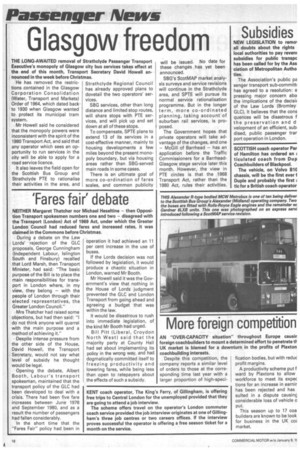'Fares fair' debate
Page 14

If you've noticed an error in this article please click here to report it so we can fix it.
.NEITHER Margaret Thatcher nor Michael Heseltine — then Opposition Transport spokesmen numbers one and two — disagreed with the Transport (London) Act of 1969 Act, under which the Greater London Council had reduced fares and increased rates, it was claimed in the Commons before Christmas.
During a debate on the Law Lords' rejection of the GLC proposals, George Cunningham (Independent Labour, Islington South and Finsbury) recalled that Lord Marsh, then Transport Minister, had said: "The basic purpose of the Bill is to place the main responsibilities for transport in London where, in my view, they belong — with the people of London through their elected representatives, the Greater London Council."
Mrs Thatcher had raised some objections, but had then said: "I do not think anyone will quarrel with the main purpose and a method of achieving it."
Despite intense pressure from the other side of the House, David Howell, the Transport Secretary, would not say what level of subsidy he thought would be legal.
Opening the debate, Albert Booth, Labour's transport spokesman, maintained that the transport policy of the GLC had been developed to deal with a crisis. There had been five fare increases between June 1978 and September 1980, and as a result the number of passengers had fallen considerably.
In the short time that the "Fares Fair" policy had been in operation it had achieved an 11 per cent increase in the use of buses.
If the Lords decision was not followed by legislation, it would produce a chaotic situation in London, warned Mr Booth.
Mr Howell said it was the Government's view that nothing in the House of Lords judgment prevented the GLC and London Transport from going ahead and agreeing a budget that was within the law.
It would be disastrous to rush into immediate legislation, of the kind Mr Booth had urged.
Bill Pitt (Liberal, Croydon North West) said that the majority party at County Hall had set about implementing its policy in the wrong way, and had dogmatically committed itself to freezing productivity and lowering fares, while being less than open to ratepayers about the effects of such a subsidy.










































